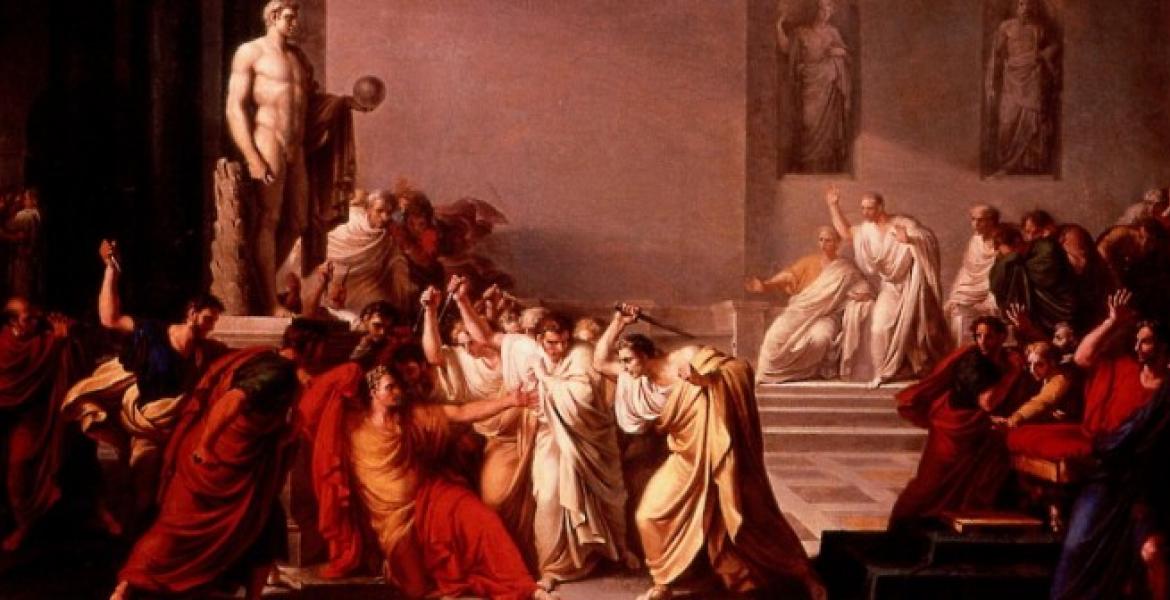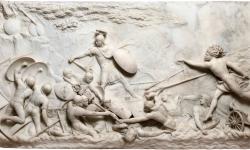The assassination of Julius Caesar
Key facts about the assassination of Julius Caesar
- Julius Caesar was murdered on the IdesIn the Roman calendar, a day falling roughly in the middle of the month. of March, 15 March 44 BCE'Before common era', the non-religious way of saying 'BC' (which means 'before Christ').
- His assassins were a number of senators who thought of themselves as 'Liberators'.
- The assassins were worried Caesar wanted to become king.
- His death led to 13 years of civil war and the establishment of the Roman Empire
People you need to know
- Marcus Antonius - commonly known as Mark Antony, was a Roman general and politician, supporter of Julius Caesar, and later a triumvirA member of a triumvirate.
- Lucius Minucius Basilus - Roman military commander and senator, and assassin of Caesar.
- Marcus Junius Brutus - descendant of Lucius Junius Brutus (who overthrew Tarquinius) and assassin of Caesar.
- Gaius Julius Caesar - famous Roman popularisLatin for 'favouring the people'. A popularis (plural populares) was a Roman politician in the Late Republic who derived power and support from the Roman masses., politician and general, who some feared wanted to be king.
- Marcus Tullius Cicero - Roman orator, lawyer, writer and politician. He may - or may not - have been involved in the plot against Caesar.
- Marcus Aemilius Lepidus - Caesar's Master of Horse and later a triumvir.
- Gaius Cassius Longinus - senator, brother-in-law of Marcus Brutus, and assassin of Caesar
- Octavian - born Gaius Octavius, Octavian was adopted by Caesar in his will, and later became Augustus, the first emperor of Rome.
- Marcus Rubrius Ruga - senator and assassin of Caesar.
- Lucius Cornelius Sulla Felix - optimasSingular of optimates, a member of the traditionalist, conservative wing of the Senate in the Late Republic. of Rome. He died in 78 BCE.
- Lucius Tarquinius Superbus - last king of Rome, who was overthrown in 509 BCE.
On the Ides of March 44 BCE, one of the most famous men in history was assassinated. Julius Caesar, general and politician of the people, had risen too far. It was rumoured he wanted to be king and his very existence could ruin the Republic. But ironically, it was the assassination of Julius Caesar that opened the way for Octavian, Caesar's adopted son, to establish an empire.
Reasons for the assassination of Julius Caesar
Rome didn't like kings and ever since Lucius Tarquinius Superbus was overthrown in 509 BCE, it had prided itself on its liberty. To be accused of wanting to be a king was one of the worst insults imaginable. The Late RepublicA time in ancient Rome lasting from about 150BCE until the assumption of power by Octavian in 30BCE. It covers a period when the foundations of the Republic became more shaky, with 'great men' achieving dominance and often ignoring the laws and traditions of the Senate. had seen many 'great men', hungry for power and fame, threaten something approaching monarchyThe king/queen and royal family of a country, or a form of government with a king/queen at the head., and even within Caesar's lifetime Sulla had marched on Rome, created war and havoc and been named dictatorA ruler with total power over a country.. But Sulla, despite providing Caesar with an example to follow, had stepped down and retired.
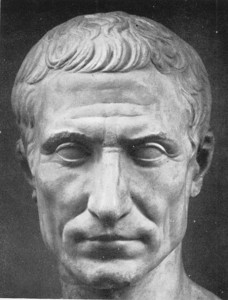
We don't know what Caesar's eventual political plans were, nor where he placed himself within them. The position of dictator in Rome was legal and, as Sulla had shown, not particularly unusual in times of emergency. But by 44 BCE, the unusual step was taken of proclaiming Caesar 'dictator in perpetuity'. Opponents worried he was grasping for something more than dictatorship: that he wanted to restore the monarchy, with himself at the head. His behaviour suggested it: he installed his friends in positions of power, started wearing the high red boots traditionally worn by Italian kings, and reacted with fury when a diademA jewelled crown or headband worn as a symbol of sovereignty. placed on one of his statues was removed. He could wear triumphal dress and the laurel wreath whenever he liked He found the wreath useful for disguising his bald spot. and his statue was placed in all existing temples. Even his admirable trait of granting clemencyShowing forgiveness and mercy in the act of judging punishment. to opponents could be seen as a reflection of it: to show mercy, one had to be in a position to have power over someone else; one had to be a king.
He found the wreath useful for disguising his bald spot. and his statue was placed in all existing temples. Even his admirable trait of granting clemencyShowing forgiveness and mercy in the act of judging punishment. to opponents could be seen as a reflection of it: to show mercy, one had to be in a position to have power over someone else; one had to be a king. Caesar's long-standing opponent Cato the Younger 'was said to have killed himself to escape it.' (Mary Beard, SPQR: A History of Ancient Rome, London: Profile Books (2015) p.295. See our review here.
Caesar's long-standing opponent Cato the Younger 'was said to have killed himself to escape it.' (Mary Beard, SPQR: A History of Ancient Rome, London: Profile Books (2015) p.295. See our review here.
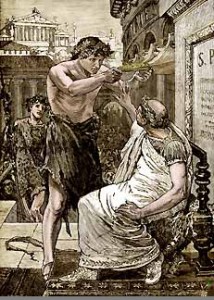
Then on 15 February 44 BCE at the LupercaliaAn ancient Roman festival of fertility, celebrated on the 15th February., with Caesar wearing a purple toga and golden wreath, he was presented with a crown by Mark Antony. The crowd was unimpressed, Caesar refused, the offer was repeated and again refused. Caesar had made it clear that he did not aim to be king. Or had he? There is much debate over his actions that day, and the intentions behind them. Given Caesar's skill with the crowd, it is unlikely it was done with no reason. Some have suggested it was unplanned, that Antony's exuberance forced Caesar into a corner, although this would seem unlikely. Was it designed to show the crowd that Caesar had no desire to be king, that he never would wear a crown? Tom Holland has suggested Caesar was not bothered by the title, nor the formal position: 'what mattered was not the form but the reality of power.' (Tom Holland, Rubicon: The Triumph and Tragedy of the Roman Republic, London: Abacus (2003) p.345). What Caesar's adoptive son, Octavian, was better at, was not being quite so obvious about the reality of that power. Or was it perhaps testing the water to see how the crowd would react? Despite Caesar's attempts at reassurance, for the Liberators there was too much risk in letting Caesar live. The risk, of course, wasn't just of political freedom and the health of the Republic, but of the senators' own dignitasThere is no direct equivalent in English. Although generally taken to mean 'dignity', it includes the sum of a man's influence, power and achievements throughout his life, as well as reputation, moral standing and entitlement to respect..
Tom Holland has suggested Caesar was not bothered by the title, nor the formal position: 'what mattered was not the form but the reality of power.' (Tom Holland, Rubicon: The Triumph and Tragedy of the Roman Republic, London: Abacus (2003) p.345). What Caesar's adoptive son, Octavian, was better at, was not being quite so obvious about the reality of that power. Or was it perhaps testing the water to see how the crowd would react? Despite Caesar's attempts at reassurance, for the Liberators there was too much risk in letting Caesar live. The risk, of course, wasn't just of political freedom and the health of the Republic, but of the senators' own dignitasThere is no direct equivalent in English. Although generally taken to mean 'dignity', it includes the sum of a man's influence, power and achievements throughout his life, as well as reputation, moral standing and entitlement to respect.. Marcus Junius Brutus was a direct descendant of the man who drove out Tarquinius, the last king of Rome in 509 BCE (according to legend). It was quite a history to live up to, and Cicero tells us that a statue of Lucius Junius Brutus stood in Marcus' house. It has been quite rightly argued that the majority of Romans would not have cared whether they were governed by a king or by a senate. Rather, they were interested in stability, peace, and freedom from starvation and oppression. The senators, however, had something to lose.
Marcus Junius Brutus was a direct descendant of the man who drove out Tarquinius, the last king of Rome in 509 BCE (according to legend). It was quite a history to live up to, and Cicero tells us that a statue of Lucius Junius Brutus stood in Marcus' house. It has been quite rightly argued that the majority of Romans would not have cared whether they were governed by a king or by a senate. Rather, they were interested in stability, peace, and freedom from starvation and oppression. The senators, however, had something to lose.
The assassination of Julius Caesar
Caesar was rather too relaxed about the danger he'd put himself in. He dismissed his guard of 2,000 men and walked openly through the streets of Rome with only his lictorsOfficers attending the consul or other magistrate. around him. Perhaps he was trying to show there was no need for Rome to worry, that he was just another man and not a monarchA king, queen, or emperor. According to Velleius Paterculus, 'He would rather die, he said, than be feared.' (Velleius Paterculus, Compendium of Roman History, 2.57) Perhaps he really thought there was no risk, despite the warnings. In the run up to the Ides of March, Caesar received several warnings of a plot to assassinate him, including from a soothsayer who supposedly said 'Beware the Ides'. Even the nightmares of his wife on the night before his death, which prompted her to beg him not to visit the Senate that day, were not enough to make him rethink. Almost every action and statement he made in the run up to his assassination seemed to be tempting the Fates.
According to Velleius Paterculus, 'He would rather die, he said, than be feared.' (Velleius Paterculus, Compendium of Roman History, 2.57) Perhaps he really thought there was no risk, despite the warnings. In the run up to the Ides of March, Caesar received several warnings of a plot to assassinate him, including from a soothsayer who supposedly said 'Beware the Ides'. Even the nightmares of his wife on the night before his death, which prompted her to beg him not to visit the Senate that day, were not enough to make him rethink. Almost every action and statement he made in the run up to his assassination seemed to be tempting the Fates. However, hindsight can be a wonderful gift. When his Master of Horse, Lepidus, asked him 'What is the sweetest kind of death?' Caesar replied 'The kind that comes without warning',
However, hindsight can be a wonderful gift. When his Master of Horse, Lepidus, asked him 'What is the sweetest kind of death?' Caesar replied 'The kind that comes without warning', Plutarch, cited in Holland, p.346. and when he saw the same soothsayer on his way to the Senate meeting, Caesar quipped, 'The day which you warned me against is here and I am still alive'. The soothsayer's response was, 'It is here – but it is not yet past.'
Plutarch, cited in Holland, p.346. and when he saw the same soothsayer on his way to the Senate meeting, Caesar quipped, 'The day which you warned me against is here and I am still alive'. The soothsayer's response was, 'It is here – but it is not yet past.' Cassius Dio, cited in ibid., p.346
Cassius Dio, cited in ibid., p.346
Caesar entered the meeting of the Senate by himself, Supporters of Caesar, such as Antony, had initially also been marked for execution but Brutus, insisting that only Caesar should be assassinated, overruled the idea. As such, the assassins made sure Antony, who was suspicious of a plot, was delayed outside. Cicero at least considered it a bad move: he thought there should be 'no leftovers'. Cicero did not get on with Antony and there was an ongoing feud between them. In the proscriptions that followed the TriumvirateA political regime dominated by three powerful individuals., Cicero would pay the price for this. He was executed while attempting to escape and his head and hand were taken to Antony and Antony's wife, Fulvia, who mutilated it before putting it on public display. which was taking place at the Curia of Pompey, part of the larger Theatre of Pompey complex. Pretending to take a petition to Caesar the conspirators surrounded him and, at a signal, acted.
Supporters of Caesar, such as Antony, had initially also been marked for execution but Brutus, insisting that only Caesar should be assassinated, overruled the idea. As such, the assassins made sure Antony, who was suspicious of a plot, was delayed outside. Cicero at least considered it a bad move: he thought there should be 'no leftovers'. Cicero did not get on with Antony and there was an ongoing feud between them. In the proscriptions that followed the TriumvirateA political regime dominated by three powerful individuals., Cicero would pay the price for this. He was executed while attempting to escape and his head and hand were taken to Antony and Antony's wife, Fulvia, who mutilated it before putting it on public display. which was taking place at the Curia of Pompey, part of the larger Theatre of Pompey complex. Pretending to take a petition to Caesar the conspirators surrounded him and, at a signal, acted.
Cimber caught his toga by both shoulders, then, as Caesar cried 'Why, this is violence!', one of the Cascas stabbed him from one side just below the throat. Caesar caught Casca's arm and ran it through with his stylus, but as he tried to leap to his feet, he was stopped by another wound. When he saw that he was beset on every side by drawn daggers, he muffled his head in his robe, and at the same time drew down its lap to his feet with his left hand, in order to fall more decently, with the lower part of his body also covered. And in this wise he was stabbed 23 times, uttering not a word, but merely a single groan at the first blow, though some have written that when Marcus Brutus rushed at him, he said in Greek: 'You too, my child?' [kai su, teknon]
Suetonius, Lives of the Twelve Caesars, 82. This has led many to wonder whether Brutus might actually have been Caesar's child. Caesar was known as being something of a ladies' man and Brutus' mother, Servilia Caepionis, was one of Caesar's lovers. However, the phrase 'my child' was also used colloquially and informally as a greeting, and many have suggested the words were said either as surprise or disappointment in Brutus or as a last act of defiance. The famous phrase 'Et tu, Brute?' is Shakespeare's invention, as is the assassination taking place on the steps of the Senate.
With so many assassins wildly stabbing at Caesar, many 'found themselves injured by the ancient equivalent of friendly fireWeapon fire coming from one's own side which causes injury or death..' Mary Beard, Confronting the Classics (London: Profile Books, 2014) p.96. Cassius cut Brutus's hand and Minucius stabbed Rubrius in the thigh. Those senators who weren't involved in the plot fled into the crowds outside, causing more chaos and confusion. Caesar's body was carried home on a litter by three slaves, with his arm dangling over the side, while his supporter Lepidus went to gather troops - but missed the assassins.
Mary Beard, Confronting the Classics (London: Profile Books, 2014) p.96. Cassius cut Brutus's hand and Minucius stabbed Rubrius in the thigh. Those senators who weren't involved in the plot fled into the crowds outside, causing more chaos and confusion. Caesar's body was carried home on a litter by three slaves, with his arm dangling over the side, while his supporter Lepidus went to gather troops - but missed the assassins.
Aftermath
Surprisingly little happened to the assassins immediately after Caesar's death. On the evening of the assassination, the 'Liberators' met on the Capitoline Hill, but did nothing to cash in on the confusion. The Senate did not meet and no instructions were issued, as if the assassins were hoping for the restorationThe restoration of the monarchy and the return to a pre-civil war form of government in 1660, following the collapse of the Protectorate. of the Republic simply by removing Caesar.
Antony staged a grand funeral for Caesar a few days later. Caesar's popularity was such that a riot developed, leading to Caesar's impromptu cremation in the Forum with wood provided by benches from the law courts. Some of the leading assassins, including Brutus and Cassius, took this as their cue to leave Rome, although neither of them gave up their official positions.
Despite this, for a while the assassins managed to put a positive spin on the events, celebrating it not as a bloody and botched murder, but as an end to tyrannyCruel and oppressive rule or use of power.. There was no legal action (as no private prosecutions were brought, and the state – thanks to the Roman legal system – didn't prosecute people). An amnestyAn official pardon. was negotiated (through the agreement of the Senate to ratify all of Caesar's decisions) and even a coin was minted, showing two daggers and the pileus, or cap of liberty worn by freed Roman slaves, with the date shown as the Ides of March. It was a celebration of liberty which, as Mary Beard says, resonated with the people like 14 July does in modern France. Cicero even claimed the majority of the people felt sympathy with the assassins, and that the act was viewed as 'the most noble of all illustrious deeds'. However, as Beard says, this was more likely wishful thinking on Cicero’s part.
However, as Beard says, this was more likely wishful thinking on Cicero’s part.
It was not long before Caesar was deified. A bright comet, visible even during the day, appeared in the sky during the games held in his honour, and was a sure sign of the man becoming divine. It is likely Caesar had been awarded divine honours during his lifetime, with Mark Antony acting as his priest. In January 42 BCE, the Senate agreed Caesar had become a god, an unlikely decision if popular sympathies lay with the assassins.
It is likely Caesar had been awarded divine honours during his lifetime, with Mark Antony acting as his priest. In January 42 BCE, the Senate agreed Caesar had become a god, an unlikely decision if popular sympathies lay with the assassins. This was a particularly useful propagandaBiased and misleading information used to promote a political cause or point of view. coupA sudden, and often violent, illegal seizure of power from a government. for Octavian, who could then term himself the 'son of a god'.
This was a particularly useful propagandaBiased and misleading information used to promote a political cause or point of view. coupA sudden, and often violent, illegal seizure of power from a government. for Octavian, who could then term himself the 'son of a god'.
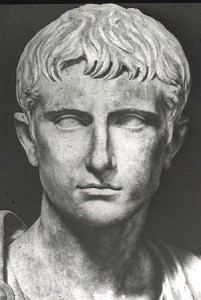
The assassination of Caesar would have far-reaching consequences for the Roman Republic. It left the 18-year-old Octavian as Caesar's heir and adopted son, providing him eventually with the means and the myth to become Rome's first emperor. The truceAn agreement between enemies to stop fighting for a limited time. did not hold much beyond the arrival of Octavian from the Balkans. Lepidus, Antony and Octavian joined together to form an official Trimvirate, ruthlessly hunting down the Liberators, Caesar's opponents, and personal vendettas. When they ran out of enemies without, they turned on each other. Lepidus was the first to lose to Octavian's scheming, living out his life in exile and obscurity. Antony put up more of a fight, but was finally defeated at the Battle of Actium. He killed himself and died in Cleopatra's arms in August 30 BCE. After decades of civil war, first between Caesar and Pompey and then between Antony and Octavian, anything that provided stability was good. Octavian became Augustus, the first Roman emperor. The foundation of the Roman Empire, as Tom Holland says, was 'the exhaustion of cruelty'. 'Freedom' had been restored and yet the Republic had not. Paraphrasing of Cicero's letter to his friend Atticus, 14.4.
Paraphrasing of Cicero's letter to his friend Atticus, 14.4.
Things to think about
- What were the assassins of Caesar hoping to achieve?
- Is there anyway the Republic could have been saved?
- Did Caesar want to be king?
- Is there any way Caesar could have avoided assassination?
- Did the assassination of Caesar make the situation better, or worse?
- What was Caesar's relationship to Brutus?
Things to do
- Read what the primary sources have to say about the assassination of Julius Caesar. Two of the easiest to access are by Plutarch and Suetonius.
- For those with the time and resources, visit Rome to see the Area Sacra di Largo Argentina, the closest accessible spot to where Caesar was murdered.
Further reading
No book on Ancient Rome would be complete without an account of the assassination of Caesar. Two of the best, which also provide an excellent overview of the Late Republic, are Tom Holland's Rubicon: The Triumph and Tragedy of the Roman Republic and Mary Beard's SPQR: A History of Ancient Rome.
There are plenty of Roman and near-contemporarySomeone or something living or occurring at the same time. histories of the assassination of Caesar (as well as of his life). Try Plutarch or Suetonius for a start.
- Log in to post comments


